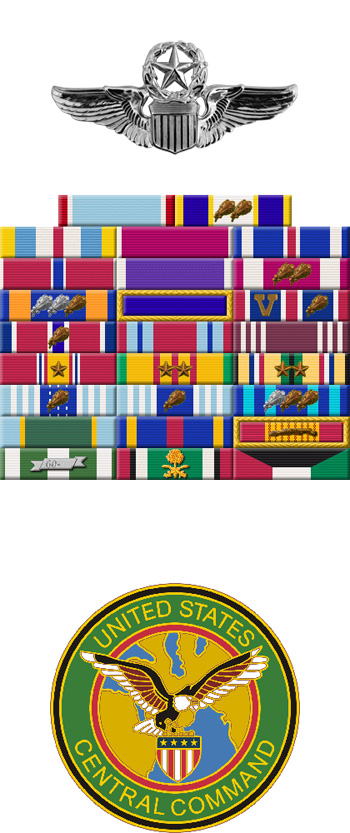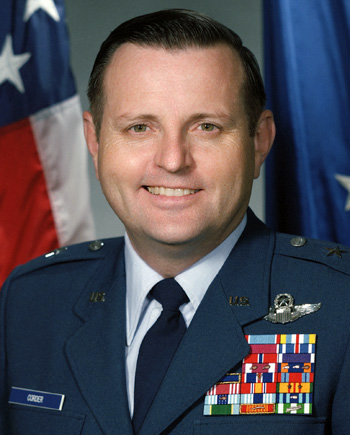
|
John A. Corder |
 |
|||
| Rank, Service | ||||
Major General O-8, U.S. Air Force |
||||
| Veteran of: | ||||
|
||||
| Tribute: | ||||
John Corder was born on August 28, 1939, in Salem, Oregon. He enlisted in the Aviation Cadet Program of the U.S. Air Force on March 20, 1959, and graduated with a commission as a 2d Lt and was awarded his Navigator Wings at Harlingen AFB, Texas, on April 5, 1960. After completing B-52 Stratofortress Combat Crew Training, he was assigned as a Navigator-Bombardier with the 9th Bomb Squadron at Carswell AFB, Texas, from November 1960 to March 1964. Capt Corder was then selected for Undergraduate Pilot Training and he was awarded his Pilot Wings at Reese AFB, Texas, in April 1965. He then completed F-4 Phantom II Combat Crew Training and was assigned to 16th and then the 40th Tactical Fighter Squadron (TFS) at Eglin AFB, Florida, from August 1965 to May 1967. Corder then deployed to Southeast Asia where he served with the 497th TFS and the 8th Tactical Fighter Wing (TFW) at Ubon Royal Thai AFB, Thailand, from May 1967 to March 1968. Maj Corder then served with the Tactical Fighter Weapons Center at Nellis AFB, Nevada, from April 1968 to January 1970, when he attended the University of Nebraska to complete his bachelor's degree. After receiving his bachelor's in August 1970, he attended Air Command and Staff College, graduating in August 1971. Col Corder then served at the Pentagon until August 1974, when he entered the National War College, graduating in June 1975. His next assignment was with the Joint U.S. Military Assistance Mission to Turkey, where he served from June 1975 to August 1976. Col Corder served as Base Commander of Nellis AFB from August 1976 to July 1978, and then served as Deputy Commander for Operations and Commandant of the U.S. Air Force Fighter Weapons School at Nellis from July 1978 to March 1979. He served as Director of Tactical Operations with Headquarters Pacific Air Forces at Hickam AFB, Hawaii, from March to October 1979, and then became Director of Inspection for the Pacific Air Forces Inspector General Team, where he served until August 1980. Gen Corder was Vice Commander and then Commander of the 3rd TFW at Clark AB in the Philippines from August 1980 to August 1983, and then served as Commander of the Defense General Supply Center in Richmond, Virginia, from August 1983 to June 1985. He then served another tour at the Pentagon, from June 1985 to August 1987, followed by service as Commander of the 65th Air Division at Lindsey AFS, West Germany, until April 1988. Gen Corder served as Deputy Chief of Staff for Operations with Headquarters U.S. Air Forces in Europe at Ramstein AB, West Germany, from April 1988 to January 1989. His final assignment was as Commander of the U.S. Air Force Tactical Air Warfare Center at Eglin AFB, Florida, where he served from January 1989 until his retirement from the Air Force on September 1, 1992. During this time, Gen Corder served as Deputy Commander of Operations for the Central Command Air Forces during Operations Desert Shield and Desert Storm from November 1990 to March 1991. Gen Corder wears Command Pilot Wings and accumulated over 4,500 flying hours during his Air Force Career. |
||||
|
||||

